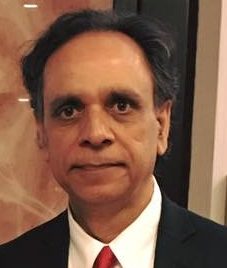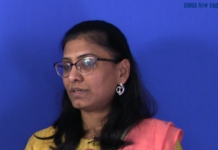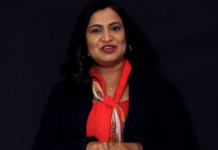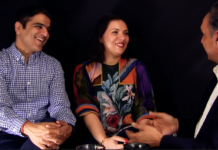By Upendra Mishra
BOSTON—A friend of mine had been insisting that I should watch a Bollywood movie “Kabir Singh” as she had observed some similarity between me and the movie character Kabir Singh. Finally, one day I had some time and netflixed the movie. In the beginning, I found it to be too violent, angry and so forth, but watched it all the way. I liked the way the movie ended.

Kabir Singh also took me to my memory lane, and made me reflect about my own life. While doing so, I discovered a very different aspect of myself. I had always thought of myself as someone strong, confident, and a fighter. When I looked inside myself after watching the movie, I realized how weak and coward I was. How I had hidden myself behind the shield of false ego, pride and the so-called perfection or perfect life I had imagined in a delusional way.
As a vulnerable, weak and imperfect persona of myself emerged and I acknowledged it, I started to feel as if tons of weight had been lifted off my head and heart. I started to feel joyous, happy, peaceful, complete and whole-hearted. Those negative aspects of myself had been buried deep inside myself—deep inside where even I was unable to see them. But they all were there, and, in truth, had become deeply rooted and were getting stronger everyday no matter how much I tried to ignore or deny them.
As I was going through this realization, I was thinking O My God how come I am feeling so good about myself and everything I have, and even the things I don’t have feel so good. Nothing matters. Life is beautiful. Everything is wonderful, and yes—I am enough they way I am and the way things are.
As I was going though these emotions and feelings, I thought there must be something about the power of vulnerability, weakness and imperfection on the Internet. I turned on my computer, went to YouTube and TED Talk page, and found a wonderful talk on “The Power of Vulnerability” by Brené Brown, a researcher and professor at the University of Houston’s Graduate College of Social Work, where she has spent many years studying a concept that she calls Wholeheartedness, posing the questions: How do we engage in our lives from a place of authenticity and worthiness? How do we cultivate the courage, compassion, and connection that we need to embrace our imperfections and to recognize that we are enough — that we are worthy of love, belonging and joy?
I loved her TED talk and found some more, and searched more about her and discovered she has also written several books on the similar theme such as “I Thought It Was Just Me (but it isn’t): Telling the Truth About Perfectionism, Inadequacy, and Power (2007); The Gifts of Imperfection (2010) and Wholehearted: Spiritual Adventures in Falling Apart, Growing Up, and Finding Joy ( 2011). I wanted to read those books right away and rushed to my town’s public library and found that all her books were out with the readers. The library had only one book of her available in the library: “Daring Greatly: How the Courage to Be Vulnerable Transforms the Way We Live, Love, Parent, and Lead.”
I got the book, came home and began reading and loved it. In the book, she dispels the myth that vulnerability is weakness. Instead, she says that, in truth, vulnerability is “our most accurate measure of courage.” She explains “how vulnerability is both the core of difficult emotions like fear, grief, and disappointment and the birthplace of love, belonging, joy, empathy, innovation, and creativity.” She explains that “when we shut ourselves off from vulnerability, we distance ourselves from the experiences that bring purpose and meaning to our lives.”
Brown is also critical of the so-called perfectionism culture. She calls it a shield. “Perfectionism is not the path that leads us to our gifts and to our sense of purpose; it’s the hazardous detour.”
What perfectionism is not? Here are excerpts from her book (I have summarized some):
- Perfectionism is not the same thing as striving for excellence. Perfectionism is not about healthy achievement and growth. Perfectionism is a defensive move. It is the belief that if we do things perfectly and look perfect, we can minimize or avoid the pain of blame, judgement, and shame. Perfectionism is a 20-ton shield that we lug around, thinking it will protect us, when in fact it’s the thing that’s really preventing us from being seen.
- Perfectionism is not self-improvement. Perfectionism is, at its core, about trying to earn approval. Most perfectionist grew up being praised for achievement and performance (grades, manners, rule following, people pleasing, appearance, sports.)…Healthy striving is self-focused: How can I improve? Perfectionism is other-focused: What will they think? Perfectionism is a hustle.
- Perfectionism is not key to success. In fact, research shows that perfectionism hampers achievement. Perfectionism is corelated with depression, anxiety, addiction, and life paralysis or missed opportunities.
- Perfection is not a way to avoid shame. Perfection is a form of shame. When we struggle with perfectionism, we struggle with shame.
After describing what perfectionism is not in the book, Brown says the following is perfectionism:
- Perfectionism is a self-destructive and addictive belief system.
- Perfectionism is self-destructive simple because perfectionism does not exist.
- Perfectionism is addictive, because when we invariably do experience shame, judgement, and blame, we often believe it’s because we were not perfect enough.
- Perfectionism actually sets us up to feel shame, judgement, and blame: “It’s my fault. I’m feeling this way because I’m not good enough.”
Brown argues that being imperfect and vulnerable leads to wholeheartedness and we live or do things wholeheartedly, we feel and believe that we are enough. “I am enough.”
When I read this sentence “I am enough” in the book and heard her say in her TED talk, the following lines from Isha Upanishad flashed back in my head:
“All this is full. All that is full.
From fullness, fullness comes.
When fullness is taken from fullness,
Fullness still remains.”
(Mr. Mishra is managing partner of the Waltham, MA-based integrated inbound marketing and PR firm The Mishra Group. He writes about his three passions: marketing, scriptures and gardening.)
















